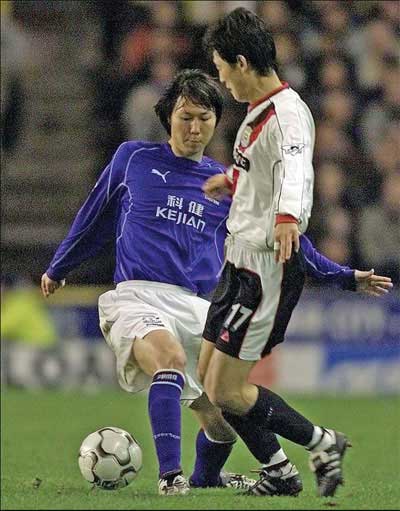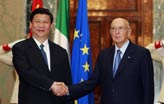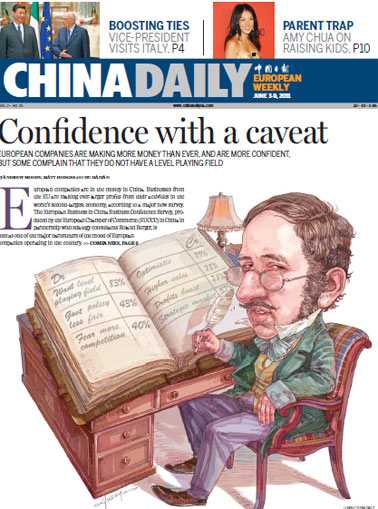In search of a Chinese football star
Updated: 2011-06-03 10:58
By David Bartram (China Daily European Weekly)
 |
|
When Everton and Manchester faced each other in 2003, it was said that 300 million to 600 million Chinese tuned in to watch Li Tie (left) battle Sun Jihai. Provided to China Daily |
Businesses look to Asian players to tap into growing markets
When Gavin Law, head of corporate affairs at Standard Chartered that sponsors Liverpool Football Club shirts, announced that he wanted the club to sign more Asian players to boost revenues, many in the football world felt he was giving voice to a view that many hold in private.
"We would love the club to have players of nationalities from the markets in which we operate," Law told The Independent newspaper earlier this year.
"If they could get a Korean, an Indian, a Chinese player - look what Park Ji-sung has done for Manchester United in terms of coverage in (South) Korea.
"Liverpool are more aware than most other clubs we've spoken to of the commercial opportunity for them. If they can sell a million shirts with another Mr Park on the back, why wouldn't you?"
Standard Chartered has good reason to push for an increase in Liverpool's global fan base. Their 23 million euro-a-season sponsorship deal with Liverpool is among the highest in world football, and they see Asia - particularly China - as key to a good return on that investment. There is just one small problem - the lack of a top quality Chinese footballer.
"There is no doubt all big European clubs would love to sign a top level Chinese player," says John Duerden, an expert on Asian football who writes about the sport for media outlets such as ESPN and The New York Times. Duerden recalls a match in 2003 between Everton and Manchester City, in which both sides fielded a Chinese international.
"The game between Everton and Manchester City with Li Tie and Sun Jihai has gone down in English folklore. There were stories of 300 to 600 million people across China staying up past midnight to watch a mid-table clash. The figures were wildly exaggerated, but it just shows the excitement that China can generate."
But while Li and Sun certainly warranted their place in the Premier League, neither developed into the sort of global sporting superstar - a Cristiano Ronaldo, Wayne Rooney or Lionel Messi - so sought after by Europe's top clubs.
The prototype for such a player can be found in basketball, where Yao Ming's success in the NBA has led to a string of Chinese endorsement deals and money-spinning tours for his team, the Houston Rockets.
But overeagerness to find a Chinese player can lead to problems. With fans more concerned about on-field success than multimillion euro endorsement deals, pushing a Chinese player regardless of ability can cause problems, as Manchester United discovered.
"If the player is not good enough, as in Dong Fangzhuo's case, then it can backfire," Duerden says. Dong joined United in 2004, but only played three games for the club as it gradually emerged he was not of the required standard, before leaving in 2008.
"It spoils the player's development, harms the reputation of Asian players and cements the idea that they are signed for commercial reasons alone. Even fans back in the player's home country can grow annoyed that their compatriot is not getting any game time, but is always trotted out at any Asia-related event."
That Manchester United would persist with Dong for so long is understandable given the success of their South Korean player Park. Since signing Park in 2005, Manchester United's popularity in South Korea has skyrocketed. More than 1.2 million South Koreans carry Manchester United credit cards and the club sold out stadiums in a matter of hours when touring the country.
But crucially Park is also one of his team's most consistent performers, something which could not be said of Dong during his stay in Manchester. Until China produces a player who can compete at the highest levels of the game, it is unlikely any club will be able to replicate in China the success Manchester United has had in South Korea.
Some, though, are optimistic that it will happen soon. "One day, China will produce a football version of Yao Ming," Duerden says. "There is no doubt that being Chinese will only add to his value for clubs desperate to expand into a huge and fast-growing market."
E-paper

Harbin-ger of change
Old industrial center looks to innovation to move up the value chain
Chemical attraction
The reel Mao
Improving app-iness
Specials

Vice-President visits Italy
The visit is expected to lend new impetus to Sino-Italian relations.

Birthday a new 'starting point'
China's national English language newspaper aims for a top-notch international all-media group.

Sky is the limit
Chinese tycoon conjures up green dreams in Europe with solar panels
